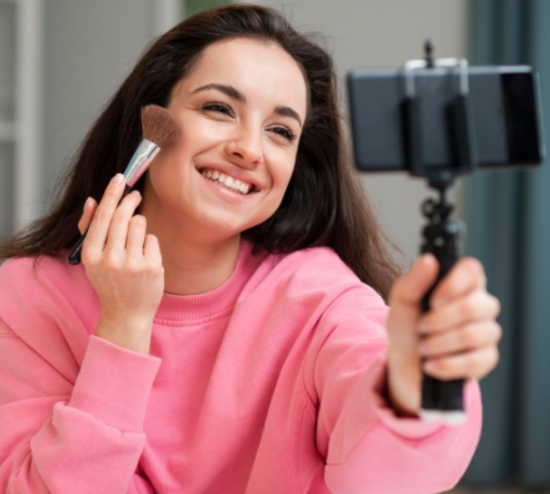Influencer marketing has dramatically reshaped how beauty brands engage with consumers, becoming a pivotal strategy for driving brand awareness and trust. In an era dominated by social media, influencers—individuals with large, dedicated followings—play an essential role in shaping trends and influencing purchasing decisions. As traditional advertising continues to take a backseat, influencer-driven campaigns offer a more authentic, relatable approach to marketing. Let’s explore how this shift is benefiting beauty brands and how they can leverage influencer collaborations to grow in today’s digital landscape.
The Power of Social Media Influencers
Influencers have become a dominant force in the beauty industry, with their ability to directly connect with audiences and drive purchasing behavior. Unlike conventional ads, influencer content feels more genuine and personal, making it resonate more effectively with potential buyers. By offering honest reviews, tutorials, and personal experiences, influencers help demystify beauty products, making it easier for their followers to make informed purchasing decisions.
Rather than relying on traditional retail displays or commercials, consumers now turn to their favorite influencers for recommendations. Whether it’s through product reviews, demonstrations, or influencer-led tutorials, beauty brands are able to engage with consumers in ways that feel more authentic and less commercial. This has led to a fundamental shift in how beauty products are discovered and purchased, with influencers now playing a central role in product popularity.
Crafting Effective Influencer Strategies for Beauty Brands
For influencer marketing to be successful, beauty brands must develop strategies that align closely with the values and audience of the influencer. Choosing the right influencers is crucial, as it’s important that their followers match the brand’s target demographic. Brands should also ensure that the influencers they work with have genuine enthusiasm for the products they are promoting, as authenticity is key to building trust with their audience.
Popular strategies include live product demonstrations and interactive tutorials, which allow influencers to showcase products in real-time. These tactics not only boost product visibility but also encourage direct engagement with potential customers, making them feel more connected to the brand. The key is to focus on influencers who share a passion for the brand and its products, fostering long-term relationships that go beyond a single promotion.
The Importance of Video Content
In the beauty industry, video content has emerged as one of the most powerful tools for engaging consumers. Unlike still images, videos offer the opportunity to demonstrate product textures, colors, and application techniques, giving viewers a more comprehensive understanding of the product’s benefits. Influencers can use video to showcase real-life results and offer their personal opinions, making the product feel more trustworthy and relatable.
With the rise of short-form video platforms like TikTok and Instagram Reels, beauty brands can reach even wider audiences through viral content. Live streaming also allows influencers to interact with their followers in real-time, creating a dynamic experience that traditional advertising simply can’t match. As social media continues to evolve, video remains one of the most influential ways for beauty brands to promote products and build consumer trust.
Building Trust Through Authenticity
The foundation of successful influencer marketing is authenticity. Consumers today are increasingly skeptical of polished, scripted content, and they prefer to engage with influencers who appear genuine and transparent in their recommendations. Influencers who share honest, unfiltered opinions about products tend to earn more trust and loyalty from their followers. This trust translates into higher conversion rates, as consumers are more likely to purchase products endorsed by influencers they believe are truly advocating for the brand.
Beauty brands that prioritize authenticity in their influencer collaborations are better positioned to foster lasting relationships with their audiences. This connection, based on shared values and transparency, is essential for building long-term brand loyalty.
Utilizing Data and Analytics to Optimize Campaigns
Data and analytics play a crucial role in maximizing the success of influencer campaigns. By tracking metrics such as engagement rates, clicks, and conversions, brands can gain valuable insights into which influencers and strategies are delivering the best results. This data-driven approach allows brands to refine their campaigns, allocate resources more effectively, and ensure they are targeting the right audience.
Leveraging analytics enables beauty brands to optimize their influencer partnerships, ensuring that each campaign delivers the highest return on investment. Understanding the performance of each collaboration helps brands continuously improve their marketing strategies and stay ahead of trends.
Successful Case Studies in Influencer Marketing
Looking at successful influencer campaigns can provide invaluable lessons for beauty brands seeking to replicate similar success. Successful campaigns often share several key characteristics: clear brand messaging, strong alignment between the influencer and the brand, and a strategic use of social media trends. By studying these examples, brands can gain insights into how to structure their own campaigns for maximum impact.
Case studies of top-performing influencer marketing campaigns offer a blueprint for success, demonstrating how effective influencer partnerships can lead to increased brand recognition, consumer engagement, and sales growth.
Overcoming Challenges and Seizing Opportunities
While influencer marketing offers substantial opportunities, it also comes with challenges. Fluctuating platform algorithms, managing influencer relationships, and navigating advertising regulations are just a few obstacles brands face. However, these challenges also present opportunities for growth and innovation. Brands that stay adaptable and anticipate changes in the digital landscape are more likely to remain competitive.
Looking ahead, emerging technologies like augmented reality and increasingly personalized marketing strategies will continue to shape the future of influencer marketing. By staying innovative and listening to consumer feedback, beauty brands can position themselves for continued success in this rapidly evolving space.
Conclusion
Influencer marketing has become a driving force in the beauty industry, reshaping how brands connect with consumers and build trust. Through authentic content, strategic collaborations, and effective use of video, beauty brands can leverage influencers to boost visibility and foster meaningful customer relationships. As social media continues to dominate, influencer marketing remains a powerful tool for brands looking to thrive in today’s competitive beauty market.


